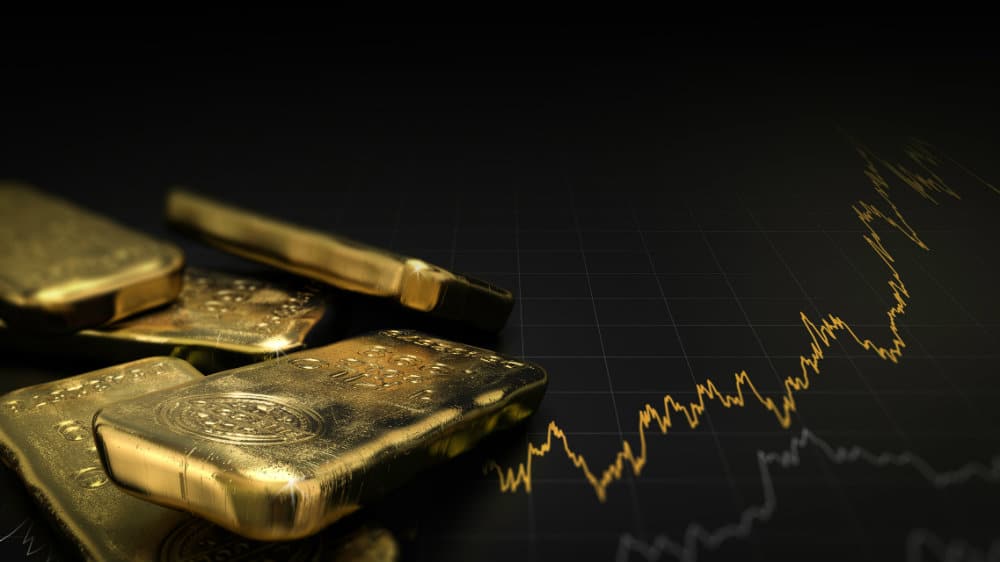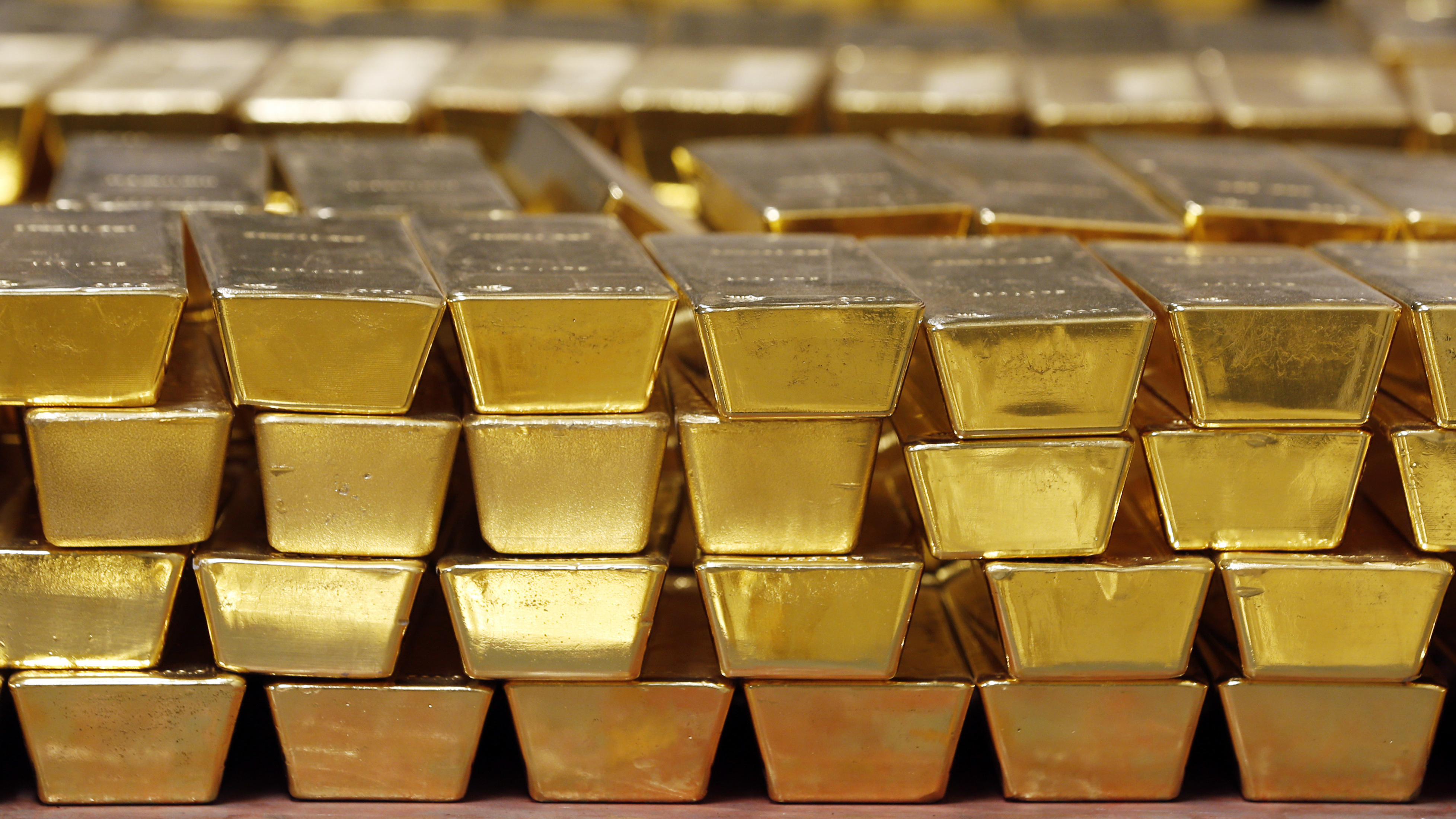Finance
Why Gold Prices Are At Record Highs

From central banks to Costco shoppers, everyone is purchasing gold these days. Spot gold touched $2,364 per ounce on Tuesday, following seven consecutive sessions of record highs and trading at $2,336 per ounce on Monday. Year on year, gold is up 16.5%.
Investors who expect the Federal Reserve to lower its benchmark interest rate are the primary drivers of price increases, but other factors, such as central banks buying gold, headed by China, to reduce reliance on US currency, are also contributing.
Why Gold Prices Are At Record Highs
Central banks view gold as a long-term store of value and a haven during periods of economic and international crisis.
Gold is regarded as a reliable investment. When interest rates fall, gold prices often climb, as bullion becomes more tempting than income-paying assets such as bonds. Investors also view gold as a hedge against inflation, anticipating that it would preserve its value as prices rise.
According to Reuters, the People’s Bank of China purchased gold for the 17th consecutive month in March, adding 160,000 ounces to its stockpile of 72.74 million troy ounces.
According to a UBS research note dated April 9, central banks may wish to “diversify away” from the US currency and acquire it in the face of geopolitical instability. Demand drives up prices as China expands its reserves, which traditional investors have already increased.
According to a Capital Economics research report published on April 9, Chinese investors are looking to gold as an alternative asset due to recent downturns in property valuations and equity prices.
Other central banks, including India and Turkey, are expanding their reserves. According to UBS, India’s GDP growth is fueling these acquisitions.
A sign of the times?
According to Ulf Lindahl, CEO of Currency Research Associates, central banks’ appetite for gold indicates a declining reliance on the dollar.
Lindahl said in an email that dollars are becoming increasingly undesirable to central banks seeking to reduce their economic dependency on the United States.
According to a March JP Morgan research note, nations not allies of the United States may accumulate gold to “mix away from dollars” and lessen vulnerability to sanctions.
According to the note, central bank purchases have fuelled the rise in gold prices since 2022. According to JP Morgan, gold may be entering a strong era, as central bank purchases of gold in 2022 were more than double the average annual buy over the previous decade.
The price increase coincides with US Treasury Secretary Janet Yellen’s visit to China to address financial stability in US-China relations and what Yellen refers to as Chinese electric vehicle overproduction.
Mark Zandi, chief economist at Moody’s, believes that rising oil costs threaten the US economy.
According to the UBS research report, higher oil costs are anticipated to raise inflationary fears, causing gold prices to rise.
The typical view of gold
The spike in gold prices indicates that investors expect the Fed to drop interest rates later this year, but they may be concerned about the prospects of containing inflation without causing the US economy to enter a recession, sometimes known as a soft landing.
According to an April 9 research note from UBS, the prospect of Fed rate cuts remains the primary driver of optimistic sentiment toward gold.
Fed Chair Jerome Powell said in remarks on April 3 that inflation remains on a “sometimes bumpy path” toward the Fed’s 2% target and that rate cuts to rebalance the economy are expected to begin later this year.
According to CME Group data, 51% of investors currently predict a quarter-point decrease in June. However, employment growth in March exceeded projections, casting doubt on the need for numerous rate reductions in an economy that remains strong.
The Personal Consumption Expenditures price index, the Fed’s favored inflation gauge, increased 2.5% in the year ended in February. According to Department of Commerce figures issued this month, this represents a little uptick from the 2.4% increase in January.
The core PCE price index, which excludes the more volatile food and energy sectors, increased 0.3% monthly. Fed officials consider the index a key indicator of underlying inflation, and it fell from 0.4% in January when it increased at the strongest rate in a year.
So, why is gold soaring right now?
Some investors are buying into the frenzy around gold bullion as prices increase, pushing them further. On Reddit, proud buyers frequently create threads touting their collections.
Costco started selling bars online in August and silver coins in January. Wells Fargo estimates that the corporation currently sells up to $200 million in gold and silver per month. Chief Financial Officer Richard Galanti told analysts in December that the company had sold over $100 million in gold bars in the previous quarter.
The investment note, released on April 9, stated, “The accelerating frequency of Reddit posts, quick online sell-outs of product, and [the company’s] robust monthly eComm sales suggests a sharp uptick in momentum since the launch.”
Lindahl stated that “trend followers” and others capitalize on price increases as the long-term trend indicates much higher costs.
It’s also worth mentioning that gold has historically been a haven during political turmoil. Voters in almost 60 countries, including the US presidential election, will go to the polls this year. The increase in geopolitical and economic volatility highlights the value of precious metals.
SOURCE – (CNN)
Finance
Economist Warns Over Canada Slipping into a Cashless Society

Canadian economist Carlos Castiblanco believes that Canada should follow in the footsteps of other countries and enact legislation to protect the use of cash in the country.
Castiblanco, together with the group Option Consommateurs, is urging the Trudeau government to follow the lead of other jurisdictions in the United States and Europe in enacting legislation to slow the transition to a cash-less society.
He stated that barely 10% of transactions in Canada now use cash, and that Canada must defend cash now before more merchants begin to refuse it totally.
It is vital to act now, he told CBC Radio’s Ontario Today, before businesses begin removing all of the infrastructure required to handle and manage actual cash.
“They are already used to dealing with cash, so this is the moment for the Trudeau government to act, before it is more complicated.”
A recent online poll of almost 1,500 people commissioned by a different group, Payments Canada, discovered that the majority of respondents were concerned about the potential of cashless stores and preferred to keep the ability to use cash.
Bank fees in Canada
Above all, cash has no bank fees, is not vulnerable to privacy breaches, and may be utilized during internet outages.
The Payments Canada paper, “Social policy implications for a less-cash society,” suggests legislative action, saying that cash-based transactions have decreased from 54% in 2009 to 10% by 2021.
Aftab Ahmed, one of its writers, explained who would be most affected by a cashless future in a recent piece for Policy Options, the Institute for Research on Public Policy’s online magazine.
“For many Canadians, including Indigenous people, homeless people, aging citizens, and others who are vulnerable, cash is both a beacon of economic stability and a source of financial insecurity. “Cash is an emergency lifeline and a symbol of cultural traditions,” Ahmed explained.
“Canada must avoid sleepwalking into a cashless future and instead recognize the risk of exacerbating financial exclusion of those most vulnerable.”
Refusing to accept cash
The currency issue has already caught fire outside of Canada, according to Castiblanco, with some US states and territories beginning to pass legislation to preserve access to cash.
In 2019, Philadelphia became the first city in North America to prohibit “any person selling or offering for sale consumer goods or services at retail from refusing to accept cash as a form of payment.”
Other U.S. cities, including New York, Seattle, and Los Angeles, have since taken action on the issue.
In New York, the policy recommends fines of up to $1,500, with the Councillor who proposed the guidelines claiming that prohibiting cashless transactions preserves privacy, equity, and consumer choice.
European countries such as Norway, Spain, and Ireland have enacted similar legislation. In Ireland, the rule would mandate cash transactions at companies like as pharmacies and grocery stores that supply basic goods and services.
Source: CBC
U.K News
UK National Debt Rises to the Highest in 62 Years

UK national debt grew this month to its highest level as a share of the economy since 1961, according to figures released on Friday, adding to the financial issues that the new administration will face when it takes office following a general election in two weeks.
The UK national debt, excluding state-controlled banks, hit 2.742 trillion pounds ($3.47 trillion), or 99.8% of annual GDP, in May, up from 96.1% the previous year, according to the Office for National Statistics.
The increase came despite somewhat lower-than-expected government borrowing in May, which was 15.0 billion pounds, compared to experts’ median projection of 15.7 billion pounds in a Reuters survey.
Following an election on July 4, Britain appears to be on the verge of a change of government, with Keir Starmer’s Labour Party leading Prime Minister Rishi Sunak’s Conservatives in surveys.
During the COVID-19 epidemic, state debt in Britain skyrocketed, and the public finances have been hampered by poor growth and a 16-year high in Bank of England interest rates.
Western Nations Debt
Most other Western countries had significant rises in debt during the same period, although British debt levels are lower than those of the United States, France, and Italy.
A person enters the Treasury government building in London, Britain, on March 5, 2024. REUTERS/Toby Melville/File Purchase Licensing Rights opens a new tab.
Borrowing in the UK totaled 33.5 billion pounds in the first two months of the fiscal year, 0.4 billion more than the same period in 2023 but 1.5 billion pounds less than government budget estimates expected in March.
Capital Economics consultants warned that the lower-than-expected borrowing figures represented less public investment and would provide little comfort to Britain’s future finance minister.
“They do little to reduce the scale of the fiscal challenge that awaits them, in part because of the upward pressure on the debt interest bill from higher interest rates,” said Alex Kerr, an assistant economist at Capital Economics.
Labour and the Conservatives want to keep to existing budget rules that require official estimates – most recently updated in March – to indicate that debt as a proportion of GDP is dropping in the fifth year of the forecast.
Higher interest rates than projected in March’s budget left Britain’s next chancellor with only 8.5 billion pounds of freedom to meet these standards, down from the historically low 8.9 billion in March, Kerr noted.
Both Labour and the Conservatives have committed not to raise income tax, value-added tax, or other major levies, but government budget predictions in March revealed that tax as a percentage of GDP was on track to hit its highest level since 1948.
Source: Reuters
Canada’s Household Debt Nears $3 Trillion Under Trudeau
U.K News
Bank of England Keeps Key Interest Rate at 5.25% Despite Inflation Falling

The Bank of England maintained its main interest rate at a 16-year high of 5.25% on Thursday, despite inflation falling to its target of 2%, with several policymakers warning that a premature decrease may spark another wave of price increases.
Seven of the nine members of the bank’s ruling Monetary Policy Committee voted against a rate drop for the second week in a row, while two supported one. Interest rates have been constant since August, following a series of rises.
The statement accompanying the vote made it plain that there was disagreement on the forecast for inflation, with some expressing concern about continued significant price increases in the services sector, the key driver of the British economy.
“It’s good news that inflation has returned to our 2% target,” said Bank of England Governor Andrew Bailey, who voted to maintain current policy. “We need to be sure that inflation will stay low and that’s why we’ve decided to hold rates at 5.25% for now.”
The decision will likely dismay the ruling Conservative Party ahead of the United Kingdom’s general election in two weeks. Prime Minister Rishi Sunak would have seen a cut as good economic news, especially if it came with a drop in mortgage rates.
Upcoming UK Election
The panel maintained that the upcoming election, which the main opposition Labour Party, led by Keir Starmer, is generally expected to win, did not influence its conclusion. It stated that the decision was, as always, based on meeting the 2% inflation objective “sustainably in the medium term.”
Economists anticipate a rate decrease is on the way, either at the bank’s next policy making meeting in August or the one following in September. They expect clear evidence by then that inflation will remain close to the target for the next year or two.
“We continue to believe that the MPC will ease restrictive policy beginning in the summer and deliver two rate cuts this year,” said Sanjay Raja, Deutsche Bank’s senior U.K. economist.
The reduction in the primary inflation measure to a near three-year low of 2% in the year to May does not imply that prices are falling; rather, they are rising at a slower rate than they have in recent years during a cost-of-living crisis that has resulted in reduced living standards for millions in Britain.
Central banks worldwide dramatically increased borrowing costs from the lows seen during the coronavirus pandemic, when prices began to rise, first due to supply chain issues accumulated during the pandemic and then due to Russia’s invasion of Ukraine, which pushed up energy costs.
Bank of England unduly cautious
Higher interest rates, which cool the economy by making borrowing more expensive, have helped to reduce inflation, but they have also weighed on the British economy, which has hardly expanded since the pandemic’s recovery.
Critics of the Bank of England argue that it is unduly cautious about inflation and that keeping interest rates too high for too long will put undue strain on the economy. It is an accusation that has also been leveled at the United States Federal Reserve, which has held interest rates constant in recent months.
“Given that the U.K. has moved onto a milder inflationary trajectory, rate setters remain overly cautious about the likelihood of loosening policy, risking impeding the U.K.‘s growth prospects,” said Suren Thiru, economics director at The Institute of Chartered Accountants in England and Wales.
Some central banks, like the European Central Bank, have begun to decrease interest rates as inflationary pressures have subsided. On Thursday, the Swiss National Bank cut its main interest rate by a quarter of a percentage point to 1.25%.
Source: The Associated Press
-
World2 weeks ago
Former President Trump Survives Being Shot at Pennsylvania Rally
-
Tech4 weeks ago
Huawei Launches 5G-A Pioneers Program at MWC Shanghai 2024: Paving the Way for a Connected Future
-
Tech4 weeks ago
ChatGPT Answers Undiscovered Questions and Outperforms Students.
-
Sports4 weeks ago
NBA Draft: Kyle Filipowski Withdraws Unexpectedly From The First Round
-
News4 weeks ago
US Supreme Court Rejects Drug Deal that Protects the Sackler Family
-
Health4 weeks ago
US Health Agency Issues Dengue Virus Infection Warning























